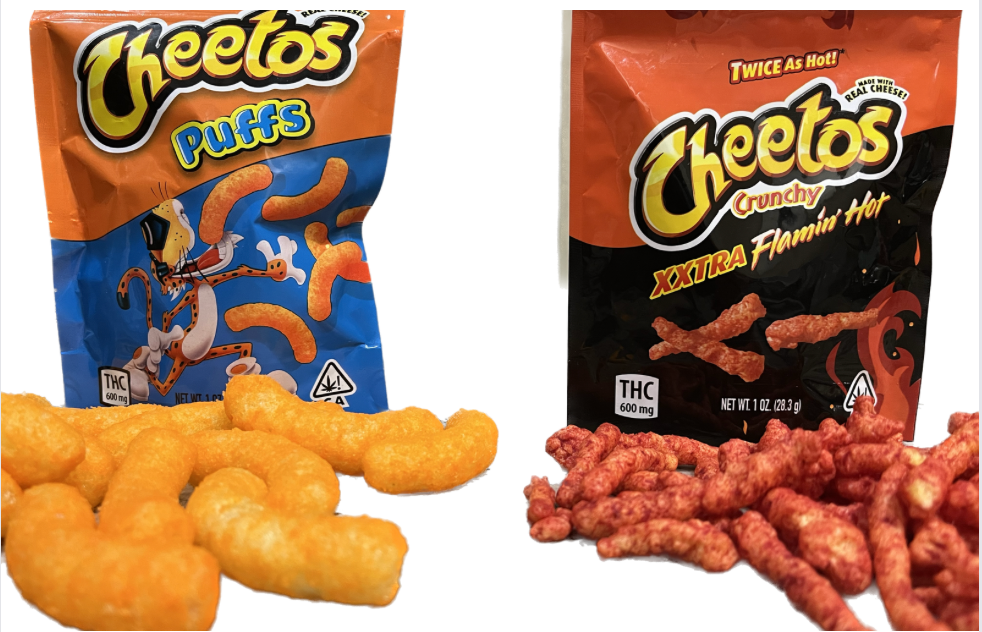Monday, April 1, 2024
 New research by Dr. Matthew Rossheim at The University of North Texas Health Science Center at Fort Worth’s School of Public Health has analyzed the concerning marketing practices of derived psychoactive cannabis
products – including their growing availability in the Fort Worth community and online
– to encourage better accountability and legislation around these hazardous substances.
New research by Dr. Matthew Rossheim at The University of North Texas Health Science Center at Fort Worth’s School of Public Health has analyzed the concerning marketing practices of derived psychoactive cannabis
products – including their growing availability in the Fort Worth community and online
– to encourage better accountability and legislation around these hazardous substances.
Rossheim, an associate professor of health administration and health policy, has published two recent peer-reviewed papers with local and national colleagues on Types and brands of derived psychoactive cannabis products: an online retail assessment, 2023 and Derived psychoactive cannabis products and 4/20 specials: an assessment of popular brands and retail price discounts in Fort Worth, Texas, 2023.
Rossheim’s two studies describe the new types and brands of derived psychoactive cannabis products being sold online, and among 98 Fort Worth, Texas, retail stores selling these products. The types of products sold included disposable vapes and vape cartridges, vape pods, edibles, pre-rolled smokes made from the dried buds – or flowers – of hemp plants, and high potency THC “dabs” that are smoked or vaped.
“DPCPs induce a ‘high’ akin to cannabis, but they are chemically created rather than grown. There has been rapid expansion in U.S. retail availability of these products following approval of the 2018 Farm Bill, which some have interpreted as implicitly legalizing DPCP production and sale,” Rossheim said.
The Farm Bill, or Agriculture Improvement Act of 2018, authorized the production of hemp and removed hemp and hemp seeds from the Drug Enforcement Administration’s schedule of controlled substances.
“There are currently no federal regulations on product safety or marketing, which is concerning since DPCP use is associated with numerous public health risks including psychiatric, gastrointestinal and respiratory problems, injuries and poisonings,” Rossheim noted.
“Amplifying these concerns is that many brands market their products in ways that appeal to children.”
 THC gummies, chocolates, candy, cookies and chips that resemble real food products
like Cheetos bags or have cartoon characters on the labels are clearly targeting children,
Rossheim said.
THC gummies, chocolates, candy, cookies and chips that resemble real food products
like Cheetos bags or have cartoon characters on the labels are clearly targeting children,
Rossheim said.
“These products are difficult for parents and teachers to recognize. There are regulations around children being in liquor stores, yet there are no laws stopping these THC products from being sold in easy-access places like gas stations or convenience stores,” he added.
“These products are also sold online without regulations or minimum age for purchase. Online companies have shipped these products directly without adequate age verification.”
Several Fort Worth stores investigated have sponsored promotional events with free THC gummies, product discounts and live demos where people could test cartridges and take hits off bongs in their stores. Some stores featured food trucks, DJs and other entertainment to draw customers in during the informal holiday, “4/20,” that celebrates cannabis use.
The products are made starting with the cannabis plant – hemp – and adding acids to create various types of THC as some of the chemical byproducts. Stores are now marketing up to 26 different intoxicating compounds, with some products containing up to eight different ones. The health and psychological effects of these mixes are not yet known, Rossheim noted.
“Nobody really knows what they are putting in their body,” he said. “Concerningly, some of these new compounds are marketed as being much more potent than ‘regular’ THC products.”
“These synthetic products are intended to get around cannabis laws. They are selling intoxicating cannabis products as if they were hemp-produced T-shirts or shoes. It’s a messy legal situation right now, as there are federal laws that may appear to conflict.”
Rossheim’s research found nearly 100 Fort Worth stores selling these intoxicating compounds and identified the top THC brands being sold, to help create awareness among the public, public health professionals and lawmakers. This is the first research of its kind, to call out product types and the names of some of the most common brands.
“Imagine trying to protect the public from the harms of e-cigarettes but not knowing any of the major brands or companies involved,” Rossheim pointed out. “This research helps lay the foundation for additional research and advocacy efforts.”
Because these products are so new, he noted, the harmful effects from use are not yet fully known. This makes it nearly impossible to effectively regulate them. The call to action from this new research, Rossheim said, is that laws prohibiting the sale of these products are urgently needed. The research findings are intended to inform policy, public health practice and further research.
On March 20, 2024, the attorneys general of 21 states submitted a letter to the U.S. Senate’s committee on agriculture, nutrition and forestry calling attention to this critical public health risk and requesting “much needed improvements” to the Farm Bill prior to its reauthorization this year.
“It’s terrifying that high doses of unstudied, intoxicating chemicals can be packaged
as candy and sold to anyone, let alone to children. The upcoming reauthorization of
the Farm Bill should explicitly exclude these compounds from the definition of hemp;
state laws are also needed to prevent their sale in communities,” Rossheim said.
From HSC Newsroom - Research by Sally Crocker